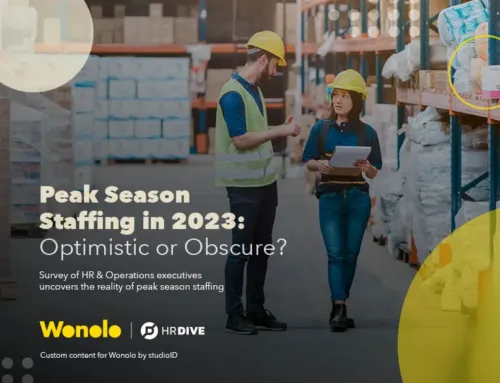Wonolo
Everyone’s talking about the gig economy. With an increasingly greater portion of the workforce turning to freelancing, independent contracting, and gig-based employment, there’s a growing talent pool for employers to choose from.
But what’s the biggest benefit for employers who decide to take advantage of the gig economy? To find out how employers are benefiting most from the freelance workforce, we reached out to a panel of business owners, founders, and experts and asked them to answer this question:
What’s the single biggest way employers can benefit from the gig economy today?
Meet Our Panel of Business Owners, Founders, and Experts:
 Robin Smith
Robin Smith
Robin Smith is the CEO of WeGoLook.
The single biggest way the gig economy benefits businesses is…
Flexibility. Gig workers are a flexible option for employers who want to expand into new markets, have seasonal highs and lows, or require a national footprint of field workers but can’t afford the overhead of full-time workers on the ground. By tapping into on-demand gig workers, employers can remain nimble and cost effective by utilizing gig economy platforms. Gig workers can be dispatched at a moment’s notice, receive notifications via mobile tech, and upload completed work. Simple as that.
 Leanna Johnson
Leanna Johnson
Leanna Johnson is a brand amplifier and owner of Lost Lass Freelance Journalism. She helps social entrepreneurs and small businesses create personalized content through Word Branding™, multimedia production and feature writing. Her story and work have been featured on Business Innovators Radio, Huffington Post and BBC News.
Freelancing is quickly dominating America’s workforce…
They now represent over 30% of workers in the US, and are also gaining their own rights and unions.
Aside from sheer numbers, it is extremely beneficial for employers to take advantage of outsourcing in-house work such as graphic design, copywriting, content management and marketing and social media marketing. Not only are they saving a significant amount in the long-term on employee benefits and the extra costs of keeping a staff in office, but also contributing to a new and significant portion of the economy in a meaningful way.
Freelancers tend to be more efficient, creative, innovative, focused and have greater initiative and having large portions of business taken care of off-site means a leaner, more specialized employed staff.
The only downside to taking advantage of the gig economy (freelancers) is the danger of underpaying professionals who do the same work as their own hires. Employers need to be aware that saving on the costs of running a business does not mean refusing to pay for services at market value. Working with freelancers also means being responsible about where you find them. But using content mill sites like Upwork, Craigslist or Fiverr, specifically to look for low-paid work does not encourage the growth of the gig economy, but discourages expert freelancers from working with traditional businesses and creates a stagnant economy.
 Jen Teague
Jen Teague
Jen Teague is a Hiring and Onboarding Coach who helps small businesses create and implement the right recruiting practices for their companies.
Having contracted work is much more affordable than hiring an employee…
The client doesn’t have to pay taxes or workers’ comp on the contractor, meaning big bucks are saved in the short-term. They are a great resource for work that needs to be done without having too much liability.
 Joey Montano
Joey Montano
Joey Montano is a Paid Search & Growth Consultant. He has worked in-house, with agencies, and now helps grow businesses.
Employers can get a huge benefit from the gig economy by…
Saving money, time, and resources with the right contractor. Generally, finding someone that is great for a particular job is a tall task. But once you find the right person, that person can help expedite the time it takes to implement your project, assist in the direction of the project completion, and is generally much cheaper compared to hiring.
 John Doherty
John Doherty
John Doherty is the founder of digital marketing marketplace GetCredo.com. He is a search marketing industry veteran dedicated to reforming the industry and helping businesses hire the right agency or consultant. He lives in Denver.
The single biggest way employers can benefit from the gig economy today is…
Through lowering company overhead, improving the average experience and talent level of those doing work for you, and speeding up production time. Most businesses cannot afford a person full time who can earn a six-figure salary, but through smart hiring they can get this talent on a contract or gig basis, thus benefitting from their knowledge and expertise while at the same time avoiding paying a full time salary plus benefits and office overhead. And, because you do not have to take into account many of the
considerations of a full-time here, such as culture fit or location, you can hire quicker and scale your capabilities faster.
 Sam Warren
Sam Warren
Sam Warren is the manager of marketing and partnerships at RankPay, a top-rated SEO service that helps thousands of small businesses earn higher search rankings.
The gig economy actually provides employers a bevy of benefits…
But one in particular stands out as truly high-impact. I’m referring to the fact that it empowers employers constrained by budgets to acquire highly skilled labor on a per-project basis.
As little as 5 years ago, getting an experienced developer for a project that would only last a few months could be exceedingly difficult.
For employers, the gig economy has expanded the talent pool and made it easier to work within their budgets.
 AJ Saleem
AJ Saleem
AJ Saleem is the Director of Suprex Tutors Houston, a leading private tutoring and test prep company based in Houston. AJ has created a big dent in the private tutoring market by offering well-trained, highly qualified teachers who are also dynamic instructors. The company also operates in New York and Chicago.
The main way employers can benefit from the gig economy is…
That they can finish tasks without hiring new employees. Why pay for a contractor when you can list out a request and have qualified professionals look for you?
 Garrison Wynn
Garrison Wynn
Garrison Wynn is a leading keynote speaker with more than 20 years of experience in providing sales and marketing advice to Fortune 500 companies including American Express, Oracle, Wells Fargo, and NASA. He is the #1 Amazon best-selling author of The Real Truth about Success and The Cowbell Principle.
Though it’s possible to encounter a list of lazy losers…
Many who set themselves up for short contracts and temporary work are some of the best of the best. They can come in and do a great job and have all the time off they want – they have control of their destiny. And a high percentage of people who control their destiny are the most talented and have the most to offer. However, an advantage rarely discussed is that employers have an opportunity to make fantastic offers to turn some of these highly effective workers into permanent employees with the right approach. Taking on the short-term contracts and contractors and gig-style employees can be a great way to find some of the best long-term, permanent individuals. The most talented people who have the most to contribute to a business’ bottom line are not beating down your door and showing up for interviews.
 Deborah Sweeney
Deborah Sweeney
Deborah Sweeney is the CEO of MyCorporation.
The biggest way employers can benefit from the gig economy is…
To hire people who are true experts in their field without having to actually ‘hire’ them. Leveraging the expertise of people who promote their services on gig-related outlets is a fantastic way to supplement your business with services that you may not need full time. For example, graphic design work for a website or logo can be a great outsourced gig even though you do not need a graphic designer full time. Hiring a copywriter to create content can be an excellent opportunity for a business owner who may otherwise not be able to afford a full-time copywriter. The gig economy gives business owners an opportunity to have experts on their team and gives those experts the chance to prove themselves. If it turns out their services are really valuable, it may even become a full-time gig over time.
 Tyler Riddell
Tyler Riddell
Tyler Riddell is the Director of Marketing for eSUB Construction Software with over 15 years of experience in Marketing, Product Management, Advertising, and Public Relations. He has a proven track record for successful go to market and corporate communication programs in multiple vertical tech markets.
Companies are benefiting from the changing landscape of the entrepreneurial workspace…
Smaller businesses are more likely to feel the impact of the changes, since larger companies tend to have major contracts with partners. Small companies can feel the advantages financially by entering into smaller-scale relationships with specialized freelancers. It’s a trend that’s happening worldwide in the workforce.
 Katie Perry
Katie Perry
Katie Perry is the Editor of AND CO.
Employers benefit from independent workers by…
Staffing people against objectives in real-time, versus trying to retrofit a role into the organization in the long term. The modern career path differs from that of generations past in that it’s marked with near-constant movement and change. it’s more flexible for both employees and employers (see visual here). For employers, this leads to situations in which people are matched to specific objectives, rather than dated job roles that may or may not be fully applicable at a given moment in time.
Of course, independent workers face their own set of benefits. More than 68 percent of freelancers say their quality of life has improved since going out own their own. For many workers in the gig economy, freedom is a new form of wealth. They are valuing flexibility and their own professional development over purely financial gains.
 Jake Tully
Jake Tully
Jake Tully is the Head of the Creative Department for TruckDrivingJobs.com. He is a professional writer living in the Los Angeles area. In addition to writing about commercial transportation and entertainment, he also covers a wide variety of topics across many industries.
In hiring going through candidates for my department and hiring freelance workers for projects…
I have found that employers can greatly benefit from workers who are multi-faceted experts. In our current gig economy we see so many workers whose competitive edge is specializing in many industries or who has a colorful background with a wide variety of experience. As opposed to finding employees who may have only pursued one career path or area of expertise, employers can now choose from potential job candidates with greater breadth of work experience.
 Andrew Elliott
Andrew Elliott
Andrew Elliott is the founder of GoDesignerGo, a remote-based company that provides unlimited graphic design services to businesses for a flat monthly fee.
Use services that are part of the gig economy to help you quickly test new ideas or changes to existing ideas…
Things like throwing up a quick landing page can be done with a gig worker in less than a few days and for an extremely low cost. Or if you need to change the color of a banner ad or need an editor for a blog post – these kinds of tasks can be done quickly and iteratively with gig workers. The gig economy is not a replacement for good, in-house employees. But using a gig worker for smaller, less vital tasks can free up your in-house team to work on bigger, more important projects. We essentially offer this kind of graphic design service at GoDesignerGo and it has worked well for our customers.
 Nick Chandi
Nick Chandi
Nick Chandi is the CEO of SlickPie Accounting Software. Nick is a serial entrepreneur and a member of the Forbes Technology Council. He has extensive experience working with business software and he is a frequent speaker at national events on technology and cyber security.
Content is king…
There are plenty of ways to benefit from the economy, but none are as efficient as content writing. You can settle with a good writer to produce and edit content on a regular basis so an identity of style can be created. There are many talented writers out there that provide quality work for affordable prices, which makes it the perfect match for entrepreneurs. And since good content is still one of the best ways to attract and retain customers to your website, this kind of gig can land solid results.
 Alexis Chateau
Alexis Chateau
Alexis Chateau is the Founder & Managing Director of Alexis Chateau PR.
The biggest way to benefit from the gig economy is to use it…
Many employers are still speculating about the pros and cons. If you find a dedicated freelancer for a task, with one or two backups, you can receive high-quality work without the need to pay for office space, equipment, and benefits.
Most freelancers go into this work relationship with a preference for that arrangement. Why? Because of the freedom and flexibility freelancing affords. They set their own schedules, pick the projects they want, and don’t need to ask for time off. For a lot of people, that’s a dream come true.
 Joel Razi Lutfiyya
Joel Razi Lutfiyya
Joel Razi Lutfiyya is a serial entrepreneur that started his first business at the age of 12 selling candy bars to friends during the school day. Today, Joel consults with startup entrepreneurs and small business owners to build growth, reputation and evangelism for their brand using a common-sense approach.
Employers benefit the most from the gig economy by…
Reducing their overhead costs through using contract labor that requires no benefits or tax obligations. The cost of a freelancer can be used as a tax deduction as their fee is considered a normal business expense. Aside from tax obligations and employee benefits, the gig economy also gives employers the freedom to work in smaller spaces because they don’t require a work area for an in-house employee.
 Srini Pillay, M.D.
Srini Pillay, M.D.
Srini Pillay, M.D. is a Harvard psychiatrist and author of Tinker, Dabble, Doodle, Try: Unlock the Power of the Unfocused Mind (Ballantine Books, 2017). He is also CEO of NeuroBusiness group, voted one of the Top 20 “Movers and Shakers” in leadership development in the world by Training Industry.
A gig economy emphasizes temporary or transient jobs that are short term engagements…
Typically, this is seen as a “quick-in, quick out” situation. Yet, if employers want to benefit from the commitment of a freelancer, the culture of the company matters. Rather than simply initiating new searches every time a function is needed, employers can build a community of “gig” workers the way a building contractor might — a set of go-to workers for any particular function. This improves reliability, engagement, commitment, and a sense of belonging without being trapped. Also, by keeping an organized database by function, employers can decrease the search time. To create this “gig culture” of belonging, looking more deeply at the branding (e.g., “You’re Needed. Please come home.” or a “Center for On-Call Experts”) may help employers access the gig culture more reliably and ad lib, while maintaining strong ties to those hires whom they would like to include in the temporary worker culture.
 Mitch Brudy
Mitch Brudy
Mitch Brudy is the communications director for Freiwald Law in Philadelphia and president of Community Legal Advisors, a start up legal services company.
The gig economy is a great thing for small businesses because…
It allows them to keep salary costs down and gives them the freedom to find the right person for the job. Now you can go find a designer to do brochures, one to do flyers, one to do your website, and one to do images. You aren’t trying to make one or two people adapt to things that aren’t their strengths. The same is true for developers, marketers, even sales people. Instead of having one person try to adapt to different fields it allows you to use many different people and play to their strengths. The gig economy gives small businesses the chance to operate like a large enterprise without the overhead.
 Rob Swystun
Rob Swystun
Rob Swystrun is a freelance small business communications consultant based in Winnipeg who hates business-speak and wants to see it eradicated from all business communications on- and offline.
The biggest way employers can benefit from the gig economy is…
Cost savings. By hiring someone to do one single task or only hiring them when you need them, you save money by not having to hire and train a full-time employee and provide them with benefits and everything else that a full-time position entails. Plus, if you do want to hire a full-time employee eventually, you have someone who is essentially trained for the position providing you’ve been hiring the same person to do the same task multiple times.
 Garrett Ball
Garrett Ball
Garrett Ball is president of Secure Medicare Solutions, an independent Medicare insurance brokerage, as well as several other senior-focused online resources. Over the last decade, he has worked with tens of thousands of people on comparing and understanding Medigap plans.
The biggest way that employers can benefit from today’s gig economy is…
By finding specialists to do the tasks that require a specific skill set or experience level. In the past, small businesses had a few employees, and those employees were asked to do a wide range of tasks, some of which they were not skilled or experienced enough to do. Today, when you have a task that requires a specific skill set, you can simply find a specialist to do that task using the gig economy. There’s no long-term commitment for either party and you get better work in a more efficient manner because the gig worker is specialized to do that particular task. If you use the gig economy in this way, you can keep your employees doing work they are equipped to do and outsource the rest to specialists who can work efficiently and proficiently to complete your required tasks.
 Danielle Kunkle
Danielle Kunkle
Danielle Kunkle is the co-founder at Boomer Benefits, a licensed insurance agency specializing in Medicare insurance products. We help Baby Boomers learn the ropes when they are New to Medicare.
For us the biggest benefit of a gig economy is…
That hiring freelancers fits into our workflow. Hiring a full-time in-house WordPress developer or graphic designer would be very costly, and we wouldn’t always have enough work to keep that employee busy. We use sites like Fiverr and Codeable to hire these people on a project basis. This enables us to fit the freelancer into our workflow, instead of being stressed out trying to create work to keep a full-time person busy. I’ve been able to find some amazingly talented people on these sites who can do work for us on a contract basis. You can develop relationships with them as well and rehire them for future projects too.
 Kate Sullivan
Kate Sullivan
Kate Sullivan is the managing editor of TCK Publishing, an independent press helping authors build sustainable careers. As a business psychologist and editor, Kate helps writers, entrepreneurs, and others enhance their productivity and unleash their creativity.
The gig economy is a huge boon to employers…
By outsourcing minor tasks to virtual contractors, you can free up your employees to do more high-value work. Rather than updating expense accounts, searching for travel arrangements for conferences, or doing other basic administrative tasks, employees who are given access to services like Fancy Hands, Zirtual, or Get Magic can offload these low-value tasks and focus more on the things that really move the needle. They can focus more on productive, high-value work, while the appointments, background research, and other tasks get done by gig contractors.
For the relatively affordable expense of setting up a virtual assistant subscription, you can help employees concentrate more and work more deeply on their tasks, boosting your company to new levels of efficiency and effectiveness.
 William Gadea
William Gadea
William Gadea is the Founder and Creative Director of IdeaRocket, a maker of whiteboard animation and explainer videos for business.
The biggest benefit of the gig economy for employers is…
Yes, gig workers can come in cheaper than permanent workers can, after you account for payroll taxes and benefits. Yes, they provide more flexibility to upscale or downscale quickly. But for me, the most neglected benefit is that they let you focus on your key mission. Now, not all gig workers are going to be that way – many are going to give you just as many headaches as permanent staff. But if you can get somebody that is good enough at quality control and self-management (which means they might not be quite as cheap or quite as flexible) they can really free you up to concentrate on what you do best. That is big value.
 Trent Silver
Trent Silver
Trent Silver is a millennial career and marketing expert, currently serving as CEO of Nerdster.com. Silver is also a verified Facebook celebrity, and has over 340,000 loyal fans across Facebook, Instagram, Twitter and Snapchat. Trent has 100,000+ loyal email subscribers who receive exclusive content on topics of health, wealth, giving back, entrepreneurship and new media.
From my first-hand experience as a business owner and employer, the best way to benefit from the gig economy that is present today is to…
Model your business to appeal to workers who like to work as they are able. While the new generation of workers are characteristically hard-working, they still like to work as they please. I have begun to look at my employees more as a network of freelance workers, rather than a consistent employment force. To utilize this effectively, an employer must grow their network large enough to ensure that work is able to get done under any circumstance.
 Lauren Doyle
Lauren Doyle
With a passion for launching culturally relevant brands & helping people find amazing work, Lauren Doyle launched The Booster Club to merge the fast growing natural foods & flexible workforce trends. Leveraging her experience at Red Bull, Coca-Cola & GoGo squeeZ, Lauren now builds raving fan communities for emerging CPG.
The single biggest benefit from CPG is…
That a brand can test ideas and gain access to new markets with very little risk. When working with food and beverage brands, we find that they will open a new retailer and need to support it quickly. That’s best done with feet on the ground, and the Gig Economy creates an easy path to finding good & eager talent.
 Tricia Meyer
Tricia Meyer
Tricia is the founder and managing attorney at Meyer Law, an innovative law firm with offices in Chicago and Denver helping in-house legal teams at large corporations with contract overflow work, including negotiating vendor agreements, strategic partnership agreements, customer agreements, licensing agreements and technology agreements in the U.S. and abroad.
For early stage companies…
Having scrappier resources and manpower available can be a huge cost-saver and benefit as they get their concept/company up and running. This can be especially true for branding, design, etc. However, when they try to cut legal corners, using cookie-cutter templates, that’s when things can get tricky. I’ve helped many clients out of unsound contracts and agreements because they used an online template early on that didn’t fit their business and in the long run, if they’d worked with an attorney, it would have saved them more money than the $79 they spent for the online version.
 Rupinder Mangat
Rupinder Mangat
Rupinder Mangat is the Founder & CEO of MEVEI, Inc. –America’s leading luxury brand for essential oils that creates all natural products for adding a glamorous and sensual experience to your daily beauty routine.
The single biggest way that the gig economy is helping small businesses and young startups is by…
Leveling the playing field, making a large diverse, talented and skilled resource pool available from around the world at very affordable prices; enabling us to not only scale and deploy the working capital more efficiently but also compete with the biggest players in the industry at the fraction of the cost and with access to the same or better resource pool.
We are a young start-up (with a big vision) to disrupt the essential oil industry and we have been leveraging shared services right from the start. Our finance, legal and marketing departments all leverage highly skilled professionals that have embraced the free-agent lifestyle either full time or outside of their regular professional jobs. On-demand talent platforms like Fiverr, UpCounsel and UpWork have made it very easy for the professionals and businesses to find a suitable match. Launching our online retail business using traditional marketing companies would have cost us upwards of $150,000 (for branding, identity, messaging , positioning, website development, product packaging, etc.) The gig economy provided us access to a very diverse and highly skilled set of professionals with years of experience and excellent credentials to accomplish the objective at a fraction of that cost.
The full potential of the gig economy is yet to be realized, but smart business owners and founders are leveraging the trend to validate the business models, scale and compete more efficently and prove the potential for longevity.
 Simon Slade
Simon Slade
Simon Slade CEO and Co-founder of SaleHoo.
Increased productivity is the greatest benefit of the gig economy for business owners…
The ability to hire experts on a temporary or contract basis allows you to apply more individualized skill to various areas of your business. Instead of hiring a full-time employees who is a jack-of-all-trades, you can hire multiple professionals to complete projects for you. A writer can compose your website copy, a graphic designer can create your marketing materials, and a media relations manager can navigate your PR. The gig economy provides employers with a wide range of access to extremely talented individuals on a contract basis, which improves the quality of your business operations.
 Sean Fitzpatrick
Sean Fitzpatrick
Sean Fitzpatrick is the President of TalentMap.
Incorporating independent contractors or “gig” positions into your workflow allows companies to…
Remain competitive and agile during times of less stable growth or fluctuating demand. Particularly for small businesses or startups, this can be a good way to meet the demands of your growing business without taking on too much risk in terms of hiring a team of full-time staff before your cash flow has adequately stabilized.
 Shawn Rubel
Shawn Rubel
Shawn Rubel is the Founder/CEO of Vecteezy, a stock graphics community that provides millions of vectors, icons, and illustrations for creative professionals. Originally from Canada, he now works and resides in the greater Nashville area with his family.
Hiring someone is one of the hardest challenges as an employer…
A good cultural fit may not have the right skills and vice versa. Even if you do find the right person for the job, there is no guarantee it will be a perfect, longterm situation.
In this way, hiring freelancers and people who are looking for gigs can be great. I may need a job done but can’t do it myself, either due to time constraints or the task itself. If it’s just one task, I don’t really want to hire someone full-time or even part-time. This is where the gig economy comes in. I can find someone very skilled virtually anywhere in the world. They can do work for me, get paid for what they’re doing, and then, when the job is done, we can discuss extending or ending the contract.
Hiring freelancers is not always the answer, but it can be a great option for employers and freelancers alike. Employers get the job done, and freelancers are often able to enjoy a more lenient schedule. What’s more, if employers do find a good fit, they can then discuss more permanent options. The gig economy provides employers and freelancers the chance to do a trial-run.
 Andrew Seidman
Andrew Seidman
Andrew is the Head of Operations for Digital Reach Agency, a small-business focused on digital marketing for B2B and enterprise companies. Andrew has been the behind-the-scenes guy since DRA’s founding, and is responsible for implementing best practices and new technology to enable our entirely remote workforce.
The gig economy has provided Digital Reach, as a remote, gig-focused small business, a number of large benefits…
When Digital Reach really started growing, we quickly realized that being a remote, gig-focused company gave us two distinct advantages. First, it allowed us to keep our overhead costs low, allowing us to focus on investments in our technology and employees. Second, it significantly expanded the labor pool, allowing us to acquire the best talent often for less. We’ve found remote, gig-based employment is especially appealing to people trying to start families – more time at home with spouses and children means happier and more productive employees.
Learn More About Wonolo
![]()


![[Report] Beyond the Gig: Exploring Reliable Work Options for the Modern Workforce](https://info.wonolo.com/wp-content/uploads/2023/10/Worker-Preferences-Report-Header-Image-500x383.png)



